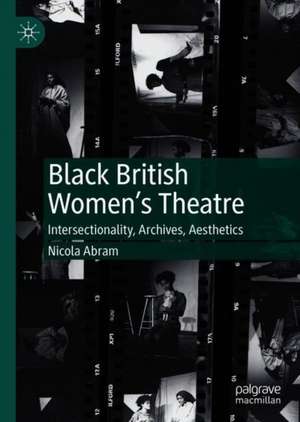Black British Women's Theatre: Intersectionality, Archives, Aesthetics
Autor Nicola Abramen Limba Engleză Hardback – 13 oct 2020
Chapters focus on five theatre companies and artists, spanning several decades: Theatre of Black Women (1982-1988), co-founded by Booker Prize-winning writer Bernardine Evaristo; Munirah Theatre Company (1983-1991); Black Mime Theatre Women’s Troop (1990-1992); Zindika; and SuAndi. The book concludes by reflecting on the politics of representation, with reference to popular postmillennial playwright debbie tucker green.
Drawing on new interviews with the playwrights/practitionersand their peers, this book assembles a rich, interconnected, and occasionally corrective history of black British women’s creativity. By reproducing 22 facsimile images of flyers, production programmes, photographs and other ephemera, Black British Women’s Theatre: Intersectionality, Archives, Aesthetics not only articulates a hidden history but allows its readers their own encounter with the fragile record of this vibrant past.
| Toate formatele și edițiile | Preț | Express |
|---|---|---|
| Paperback (1) | 695.01 lei 6-8 săpt. | |
| Springer International Publishing – 13 oct 2021 | 695.01 lei 6-8 săpt. | |
| Hardback (1) | 700.42 lei 6-8 săpt. | |
| Springer International Publishing – 13 oct 2020 | 700.42 lei 6-8 săpt. |
Preț: 700.42 lei
Preț vechi: 824.03 lei
-15% Nou
Puncte Express: 1051
Preț estimativ în valută:
134.02€ • 140.31$ • 110.90£
134.02€ • 140.31$ • 110.90£
Carte tipărită la comandă
Livrare economică 05-19 aprilie
Preluare comenzi: 021 569.72.76
Specificații
ISBN-13: 9783030514587
ISBN-10: 3030514587
Pagini: 264
Ilustrații: XIII, 264 p. 24 illus.
Dimensiuni: 148 x 210 mm
Greutate: 0.52 kg
Ediția:1st ed. 2020
Editura: Springer International Publishing
Colecția Palgrave Macmillan
Locul publicării:Cham, Switzerland
ISBN-10: 3030514587
Pagini: 264
Ilustrații: XIII, 264 p. 24 illus.
Dimensiuni: 148 x 210 mm
Greutate: 0.52 kg
Ediția:1st ed. 2020
Editura: Springer International Publishing
Colecția Palgrave Macmillan
Locul publicării:Cham, Switzerland
Cuprins
1. Introduction: Intersectionality, Archives, Aesthetics.- 2. Theatre of Black Women.- 3. Munirah Theatre Company.- 4. Black Mime Theatre: The Women’s Troop.- 5. Zindika.- 6. SuAndi.- 8. Conclusion: In the spirit of Sankofa.-
Notă biografică
Nicola Abram is Lecturer in Literatures in English at the University of Reading, UK. She has previously published on plays by debbie tucker green, Helen Oyeyemi, and Winsome Pinnock, and on the history of black British and British Asian arts collectives.
Textul de pe ultima copertă
This book marks a significant methodological shift in studies of black British women’s theatre: it looks beyond published plays to the wealth of material held in archives of various kinds, from national repositories and themed collections to individuals’ personal papers. It finds there a cache of unpublished manuscripts and production recordings distinctive for their non-naturalistic aesthetics. Close analysis of selected works identifies this as an intersectional feminist creative practice.
Chapters focus on five theatre companies and artists, spanning several decades: Theatre of Black Women (1982-1988), co-founded by Booker Prize-winning writer Bernardine Evaristo; Munirah Theatre Company (1983-1991); Black Mime Theatre Women’s Troop (1990-1992); Zindika; and SuAndi. The book concludes by reflecting on the politics of representation, with reference to popular postmillennial playwright debbie tucker green.
Drawing on new interviews with the playwrights/practitioners andtheir peers, this book assembles a rich, interconnected, and occasionally corrective history of black British women’s creativity. By reproducing 22 facsimile images of flyers, production programmes, photographs and other ephemera, Black British Women’s Theatre: Intersectionality, Archives, Aesthetics not only articulates a hidden history but allows its readers their own encounter with the fragile record of this vibrant past.
Chapters focus on five theatre companies and artists, spanning several decades: Theatre of Black Women (1982-1988), co-founded by Booker Prize-winning writer Bernardine Evaristo; Munirah Theatre Company (1983-1991); Black Mime Theatre Women’s Troop (1990-1992); Zindika; and SuAndi. The book concludes by reflecting on the politics of representation, with reference to popular postmillennial playwright debbie tucker green.
Drawing on new interviews with the playwrights/practitioners andtheir peers, this book assembles a rich, interconnected, and occasionally corrective history of black British women’s creativity. By reproducing 22 facsimile images of flyers, production programmes, photographs and other ephemera, Black British Women’s Theatre: Intersectionality, Archives, Aesthetics not only articulates a hidden history but allows its readers their own encounter with the fragile record of this vibrant past.
Caracteristici
This is the first critical study of black British women's theatre to centre unpublished playscripts and other archival materials, many of which have not previously been studied in print Focuses on theatrical form, tracing how selected companies, practitioners and playwrights have creatively responded to racism and sexism Builds on the pioneering monographs by Gabriele Griffin (2003) and Lynette Goddard (2007), heralding a timely shift towards examining and enjoying the depths of this rich field
